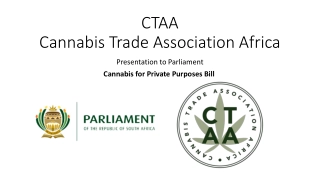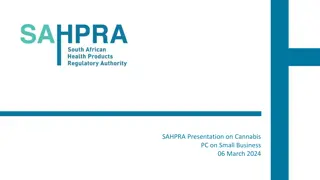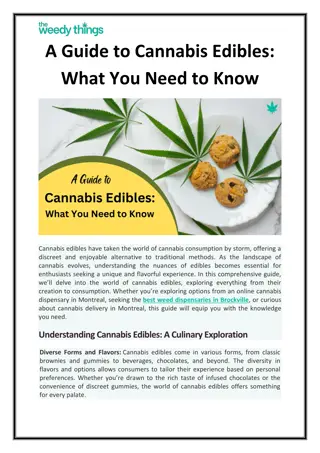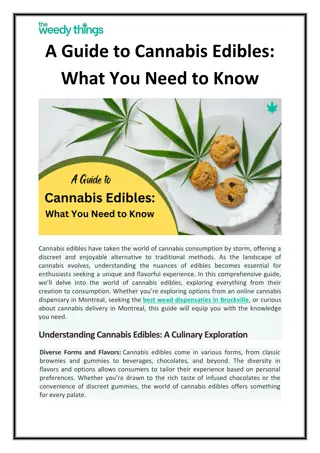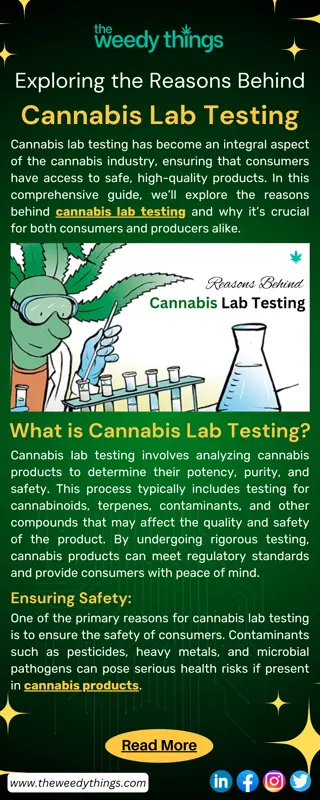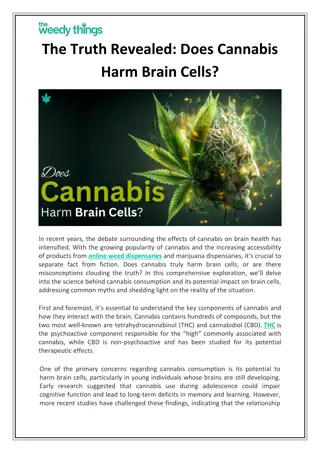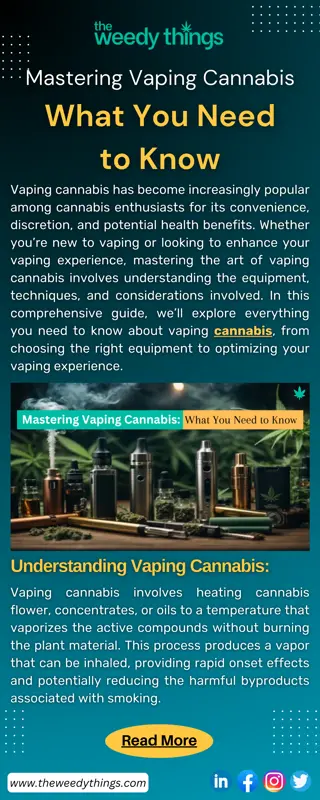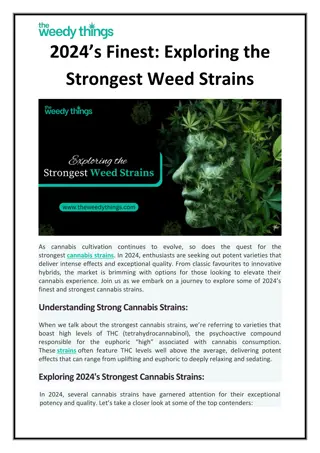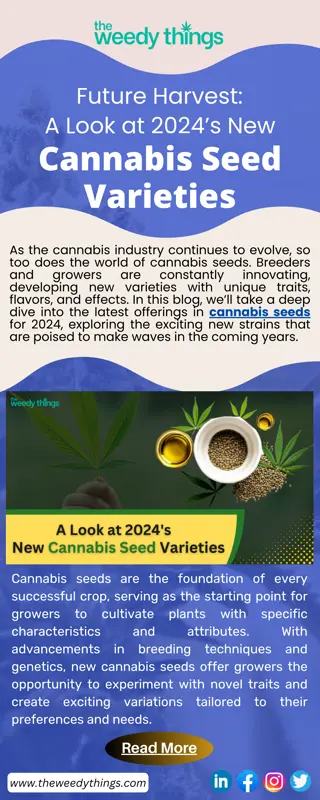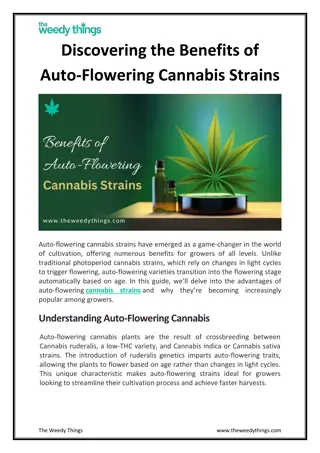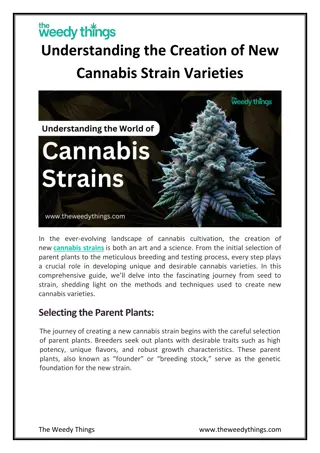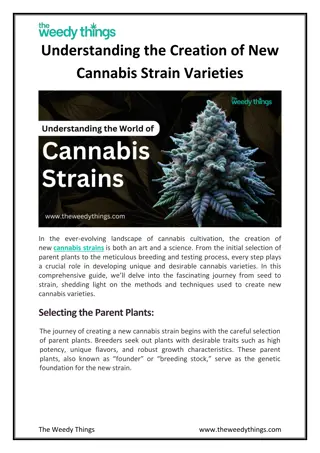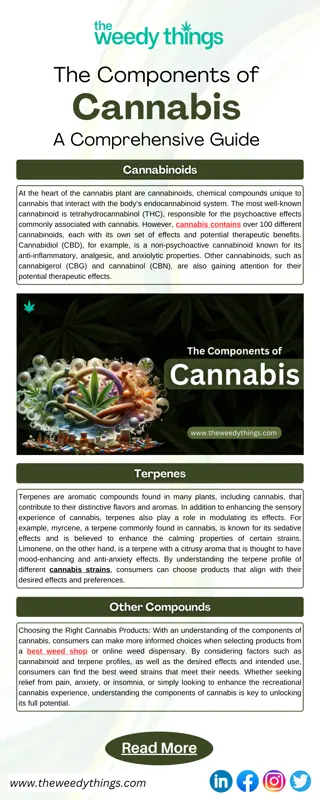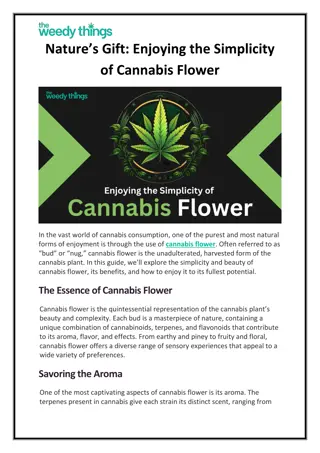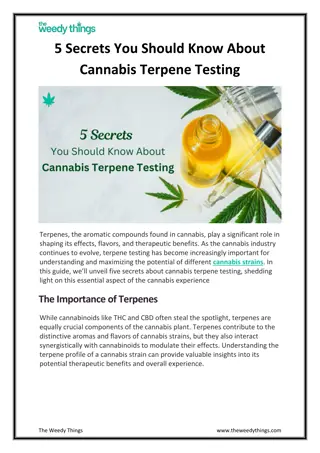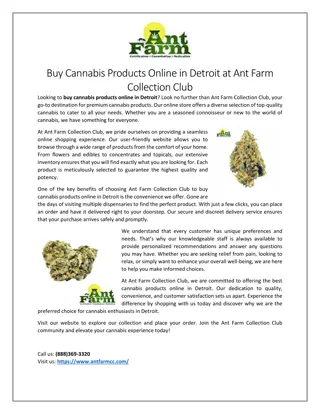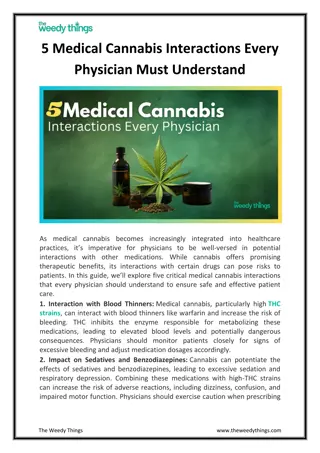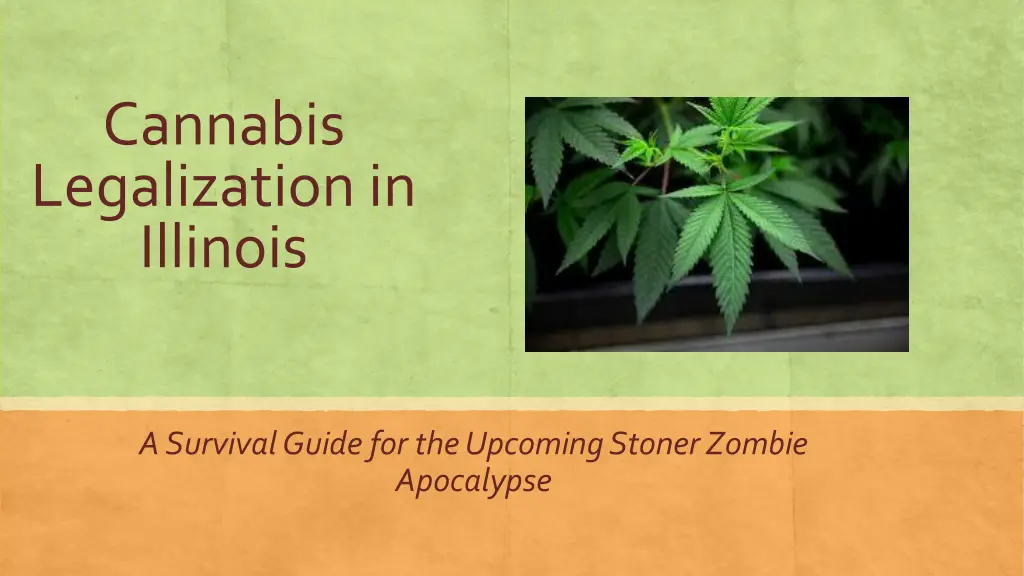
Survival Guide for Illinois Cannabis Legalization & Zombie Apocalypse
Delve into the history of marijuana laws in the US, from criminalization to decriminalization. Explore the changing faces of marijuana through the decades. Discover the evolution of cannabis in Illinois, from medicinal purposes to decriminalization and expansion. Get ready for the upcoming stoner zombie apocalypse with this comical guide.
Download Presentation

Please find below an Image/Link to download the presentation.
The content on the website is provided AS IS for your information and personal use only. It may not be sold, licensed, or shared on other websites without obtaining consent from the author. If you encounter any issues during the download, it is possible that the publisher has removed the file from their server.
You are allowed to download the files provided on this website for personal or commercial use, subject to the condition that they are used lawfully. All files are the property of their respective owners.
The content on the website is provided AS IS for your information and personal use only. It may not be sold, licensed, or shared on other websites without obtaining consent from the author.
E N D
Presentation Transcript
Cannabis Legalization in Illinois A Survival Guide for the Upcoming Stoner Zombie Apocalypse
A Comically Abbreviated History of Marijuana Laws in US: Criminalization 1906 1938: Individual State Poison Laws Limit sales to pharmacies MD prescription 1937: Marihuana Tax Act Effectively outlawed possession and transfer of marijuana 1970: Controlled Substances Act Schedule I Drug High Potential For Abuse + No Medical Use
A Comically Abbreviated History of Marijuana Laws in US: De-criminalization 1978-82: First Compassionate Use Programs 1988: DEA judge recommends re-classification as Schedule II drug 1996: Compassionate Use Act (CA) Medical marijuana upon physician prescription for certain conditions/diagnoses 2014: Rohrabacher-Farr Amendment Prohibit federal prosecution of individuals acting in accordance with state cannabis laws
The Changing Faces of Marijuana (1930s)
The Changing Faces of Marijuana (1960s)
The Changing Faces of Marijuana (1970s)
The Changing Faces of Marijuana (1980s)
The Changing Faces of Marijuana (1990s)
The Changing Faces of Marijuana (2010s)
The Changing Faces of Marijuana (2010s)
Cannabis in Illinois: It s For Medicinal Purposes 2013: Medical Cannabis Program Legalized medical cannabis under certain circumstances As of July 2019: 76,000 qualified patients enrolled 2016: De-criminalization Less than 10 grams $100-200 fine 2018: Medical Cannabis Expansion Opioid painkiller replacement
Cannabis in Illinois: Let s Get Recreational! 2019: Illinois Cannabis Regulation and Tax Act (410 ILCS 705/1, et. seq.) Possession of up to 30 grams legal for IL residents over age 21 Expungement provisions for marijuana-related convictions Social equity provisions regarding distribution licenses Local communities decide whether or not to allow + how to tax + zoning issues Created Illinois Cannabis Regulation Oversight Officer within IDPFR; and Created Cannabis Health Advisory Committee within IDHS
Marijuana Laws Across the States A Brief Comparative Analysis
Illegal (17 states) The following states have not legalized medical or recreational use to any degree: North Carolina Alabama South Carolina Georgia South Dakota Idaho Tennessee Indiana Texas Iowa Virginia Kansas Wisconsin Kentucky Wyoming Mississippi Nebraska
Medical, but not recreational use (22 states) The following states allow medical marijuana to be prescribed by physicians for certain ailments, but don t allow recreational use: Arizona New Hampshire Arkansas New Jersey Connecticut New Mexico Delaware New York Florida North Dakota Hawaii Ohio Louisiana Oklahoma Maryland Pennsylvania Minnesota Rhode Island Missouri Utah Montana West Virginia
Full recreational, no retail sales yet (3) The following states have fully legalized recreational marijuana + allow medical marijuana to be prescribed by physicians, but are not selling any recreational product yet: Illinois Sales to begin January 1, 2020 Michigan Michigan voters legalized a recreational marijuana initiative in 2018, but licensed sales activity not expected to start until sometime in 2020 Vermont Legislature legalized recreational use in 2018, but forbids retail sale (expected to change sometime soon in 2020) First state to legalize through legislative process (rather than ballot initiative)
Full recreational and selling (8) The following states allow recreational marijuana to be sold in licensed dispensaries + allow medical marijuana to be prescribed by physicians: Alaska (2014) Massachusetts (2016) California (2016) Nevada (2016) Colorado (2012) Oregon (2014) Maine (2016) Washington (2012) District of Columbia (2014)
Illinois is the second state to legalize small amounts of marijuana for adult recreational use solely through the legislative process but the first to authorize retail sale through legislation Social Equity Provisions Illinois is the first state to enact social equity programs to support minority operated marijuana businesses at the same time as recreational use is legalized and is most comprehensive to date Illinois statute aims to give minorities an even playing field by giving qualified applicants lower licensing fees, access to business loans, and technical assistance Financial assistance is especially focused on those who have lived in impoverished areas with high marijuana arrest rates Cannabis Business Development Fund Illinois will help lower licensing fees for and provide low-interest business loans to minority entrepreneurs Will improve representation of minorities as business owners in the industry Job training (Community College Cannabis Vocational Pilot Program 410 ILCS 705/25) Statute will establish marijuana job training programs at community colleges (growing, establishing business practices, professional responsibility, legal compliance, etc.) Up to 8 schools will roll out these programs by September 2020 (5 of which must have a student population that is more than 50% low income) Restore, Reinvest, and Renew Program (R3) Earmarks part of marijuana sales as revenue for neighborhood development grants awards grants to help revitalize and address violence in communities affected by the war on drugs The R3 Program Board, chaired by the Lieutenant Governor, will approve the distribution of resources from 25% of cannabis revenues and make awards based on the likelihood that grantee plans will achieve outcomes related to gun injury rates, youth development, economic development, unemployment, child poverty, recidivism, and civil legal aid
Law Enforcement / Criminal Law Issues
PROBABLE CAUSE FOR VEHICLE SEARCHES Odor of Cannabis Usually A Basis for Vehicle Search People v. Stout, 106 Ill.2d 412 (1985)
DECRIMINALIZATION VS. LEGALIZATION Decriminalization: Illinois leans towards continuing to support odor of cannabis as basis to search. In Re O.S., a minor, 2018 IL App (1st) 171765 (2018) People v. Rice, 2019 IL App (3d) 170134 (2019) Legalization: ??????????????????????
Professor Alex Kreit Predicts that cannabis legalization will eliminate probable cause or reasonable suspicion of criminal activity. University of California, Davis Law Review, Vol.50:741 (Fall 2016)
DUI ENFORCEMENT Current Law: Illegal to drive or to be in actual physical control of any vehicle while either: 1.Under the Influence of Cannabis; or 2.With a THC Concentration of 5 Nanograms or more within 2 hours of driving. 625 ILCS 5/11-501 and 625 ILCS 5/11-501.2
Post-Legalization: NO CHANGE Enforcement is the Issue
Field Sobriety Tests Alcohol Impairment vs. Drug Impairment Tests Drug Recognition Experts (DRE) Other Tests?
Cannabis Use and Possession After January 1, 2020 Applies to Illinois Residents Must be at least 21 years old May possess up to 30g of raw cannabis May possess cannabis infused products with no more than 500mg of THC May possess 5g of concentrated cannabis May not use where can be reasonably expected to be viewed by others May not use in public place in close proximity of those under 21 years old May not use where smoking is prohibited by Illinois Law
Automatic Expungements An arrest not resulting in criminal charges - Immediately eligible Commencing January 1, 2020 An arrest for possession under 30g if one year or more has lapsed since date of arrest An arrest resulting in criminal charges but not a conviction - Immediately eligible, i.e. acquittal or supervision However, there is a timetable: Record date from 1-1-13 to 1-1-20 will be automatically expunged before 1-1-21 Record date from 1-1-00 to 12-31-12 will be automatically expunged before 1-1-23 Record date before 1-1-00 will be automatically expunged before 1-1-25 An arrest resulting in conviction for possession under 30g - ISP to identify eligible records and send to Prisoner Review Board; the PRB is to review and make recommendations to the Governor for a pardon. If pardoned, Attorney General then petitions the court to expunge
Exceptions to Automatic Expungements Cannabis arrest and conviction with one of the following: Stalking Violation of local ordinance Violent sex offense Sex offense involving a minor Offense requiring registration of sex offender Animal abuse offense
In The Weeds With: Jim Knippen Principal at Walsh, Knippen & Cetina Counsel for City of Wheaton + Village of Roselle Extensive experience with ordinance and zoning issues Has been dealing with this ALL YEAR
CANNABIS REGULATION AND TAX ACT/MUNICIPAL ZONING AUTHORITY The Cannabis Regulation and Tax Act (Act) preserves local zoning authority with the qualification that if the municipality does not prohibit recreational cannabis enterprises, regulating ordinances may not be more restrictive than the Act or unreasonable . The provisions of the Act related to local control of cannabis business enterprises are contained at 55 ILCS 55-25(5).
(410 ILCS 705/55-25) (1) A unit of local government, including a home rule unit or any non-home rule county within the unincorporated territory of the county, may enact reasonable zoning ordinances or resolutions, not in conflict with this Act or rules adopted pursuant to this Act, regulating cannabis business establishments. No unit of local government, including a home rule unit or any non- home rule county within the unincorporated territory of the county, may prohibit home cultivation or unreasonably prohibit use of cannabis authorized by this Act. (2) A unit of local government, including a home rule unit of any non-home rule county within the unincorporated territory of the county, may enact ordinances or rules not in conflict with this Act or with rules adopted pursuant to this Act governing the time, place, manner, and number of cannabis business establishment operations, including minimum distance limitations between cannabis business establishments and locations it deems sensitive, including colleges and universities, through the use of conditional use permits. A unit of local government, including a home rule unit, may establish civil penalties for violation of an ordinance or rules governing the time, place and manner of operation of a cannabis business establishment or a conditional use permit in the jurisdiction of the unit of local government. No unit of local government, including a home rule unit or non-home rule county within an unincorporated territory of the county, may unreasonably restrict the time, place, manner, and number of cannabis business establishment operations authorized by this Act.
(410 ILCS 705/55-25), cont. (3) rule county within the unincorporated territory of the county may regulate the on- premises consumption of cannabis at or in a cannabis business establishment within its jurisdiction in a manner consistent with this Act. A cannabis business establishment or other entity authorized or permitted by a unit of local government to allow on-site consumption shall not be deemed a public place within the meaning of the Smoke Free Illinois Act. (4) A unit of local government, including a home rule unit or any non-home rule county within the unincorporated territory of the county, may not regulate the activities described in paragraph (1), (2), or (3) in a manner more restrictive than the regulation of those activities by the State under this Act. This Section is a limitation under subsection (i) of Section 6 of Article VII of the Illinois Constitution on the concurrent exercise by home rule units of powers and functions exercised by the State. (5) A unit of local government, including a home rule unit or any non-home rule county within the unincorporated territory of the county, may enact ordinances to prohibit or significantly limit a cannabis business establishment s location. A unit of local government, including a home rule unit, or any non-home
Does the Illinois Legislature understand municipal zoning law? 1. Permitted uses; 2. Special uses/conditional use permits; 3. Unlawful uses; 4. Comparable uses; and 5. Effect of statute after January 1, 2020, if no restrictions or prohibitions are adopted.
In The Weeds With: Mike Neville Attorney at Fox Rothschild Cannabis Law practice group Licensing + regulatory compliance Application assistance Banking + financing Corporate structure Taxation
New Adult Use Licenses Department of Agriculture Cultivation centers Craft growers Infuser organizations Processors Transporting organizations Dep t of Financial & Prof. Regulation Dispensaries and agents 36
Timeline of Key Dates Nov. 25, 2019: Division s responses to 2nd round of application questions Jan. 1, 2020: dispensary applications due Jan. 7, 2020: Infuser and transporting organizations applications should be available [craft grower] March 15, 2020: Infuser and transporting applications due [craft grower] May 1, 2020: 75 dispensary licenses will be awarded July 1, 2020: DOA shall issue up to 40 craft grower, infusers and transporting organizations licenses (unclear how many transporting licenses will be available likely unlimited) Dec. 21, 2021: IDFPR issues up to 110 new dispensary licenses Dec. 21, 2021: DOA issues up to 60 licenses for craft growers, infusers and transporters 37
Medical Cultivators and Dispensaries Cultivators (grow the marijuana) 21 licensed medical cultivators No new cultivator licenses until after July 1, 2021 At no time shall the number exceed 30 Dispensaries (sell the marijuana) 55 licensed medical dispensaries As of 11/16/17, there are 14 licensed adult use dispensaries 38
Adult Use Cultivation Centers cont. Section 20-10. Early Approval of Adult Use Cultivation Center Licenses Current cultivators can apply for license to produce cannabis and cannabis infused products at its existing facilities $100k application fee (valid until 3/31/21 and 100k renewal) Fee equal to 5% of the center s total sales between June 2018 and June 2019 or $750k, whichever is less (subject to a minimum of $250k) Commitment to participate in one of the following Social Equity Inclusion Plans (similar to adult use dispensaries) 39
Medical / Adult Use Dispensaries 55 Medical Dispensaries 5 medical dispensary licenses still available Same Site Licenses $30k application fee; development fee equal to 3% of the dispensary s total sales between June 1, 2018 and June 1, 2019 or $100k, whichever is less plus identify a Social Equity Inclusion Plan Relocation Issue Zoning Issue (e.g., GTI and Naperville) Secondary Site Licenses $30k application fee; $200k fee to Cannabis Development Fund plus commitment to one of the Social Equity Inclusion Plans Jan. 1, 2020: can start selling adult use As of Nov. 16, 2019, there are 14 licensed adult use dispensaries (some in opt-out towns) 40
Adult Use Dispensaries cont. Social Equity Inclusion Plans for Medical Dispensary Same Site and Secondary Site Applications (in addition to other license fees) (identify one of the following): Make a contribution of 3% of total sales from June 1, 2018 to June 1, 2019 or $100k, whichever is less to the Cannabis Development Fund Make a grant of 3% based on the June 2018 and June 2019 sales or $100k, whichever is less, to a cannabis training or educational program at an Illinois community college Make a contribution of $100k to a job training program in a disproportionately impacted area Participate in a cannabis incubator program and provide a loan of at least $100k and mentorship to a Social Equity Applicant, provided that the sponsor cannot take an ownership stake of greater than 10% in any entity receiving incubator services Participate in a sponsorship program for at least 2 years and provide an interest free loan of at least $200k to a Social Equity Applicant, provided that the sponsor cannot take any ownership stake in any cannabis business receiving the sponsorship 41
Adult Use Dispensaries cont. 75 adult use dispensary licenses awarded on May 1, 2020 (social equity status required) $5,000 application fee $60,000 license fee (expire on March 31 of even-numbered years and renewal is $60k) 10 license limit no single person or entity can have a direct or indirect financial interest in more than 10 dispensaries Jan. 1, 2021: IDFPR shall issue up to 110 additional licenses 42
Adult Use Dispensaries cont. Description Points Suitability of Employee Training Plan 15 Security and Record Keeping 65 Business Plan, Financials, Operating Plan, and Floor Plan 65 Knowledge and Experience in Cannabis or Related Fields 30 Status as a Social Equity Applicant 50 Labor and Employment Practices 5 Environmental Plan 5 Illinois Owner 5 Status as a Veteran 5 Diversity Plan 5 TOTAL POINTS 250 43
Adult Use Dispensaries cont. Social Equity Status 3 ways to qualify: (1) an applicant with at least 51% ownership and control by one or more individuals who have resided for at least 5 of the last 10 years in a Disproportionately Impacted Area; (2) an applicant with at least 51% ownership and control by one or more individuals who: (i) have been arrested for, convicted of, or adjudicated delinquent for any offense that is eligible for expungement under the Act; (ii) is a member of an impacted family; (3) for applicants with a minimum of 10 full-time employees, an applicant with at least 51% of current employees who: (i) currently reside in a Disproportionately Impacted Area; or (ii) have been arrested/convicted/adjudicated delinquent for an expungeable offense 44
Adult Use Dispensaries cont. Disproportionately Impacted Areas: Only those applicants residing in a Disproportionately Impacted Area, as identified by the Department of Commerce and Economic Opportunity, qualify as a SEA based on their residency. A list of Disproportionately Impacted Areas identified by the DCEO is available at: https://www2.Illinois.gov/dceo/Pages/CannabisEquit y.aspx. 45
Adult Use Dispensaries cont. Employing 10 people and 6 social equity folks SEA status if, at the time of application, they have 10 or more full-time employees, at least 51% of whom: (1) reside in a Disproportionately Impacted Area (at the time of application); (2) have been arrested, convicted of, or adjudicated delinquent of an offense eligible for expungement; or (3) are a member of an impacted family. To qualify as a SEA based on the hiring of employees, the employees must be working full-time for the applicant as of the day the application is submitted. The employees may be engaged in work that is or is not related to cannabis. Need supporting documentation (e.g., W-2s, criminal records, proof residency) 46
Adult Use Dispensaries cont. Management Services Agreements Probably won t work unless social equity person truly owns 51% Ownership and control means ownership of at least 51% of the business, including corporate stock if a corporation, and control over the management and day-to-day operations of the business and an interest in the capital, assets, and profits and losses of the business proportionate to percentage of ownership. 47
Craft Growers Craft Grower: cultivate, dry, cure and package cannabis and perform other necessary activities to make cannabis available for sale at dispensaries or use at infusers/processors DOA shall issue 40 licenses by July 1, 2020 5,000 square feet of canopy space DOA may approve cultivation space in increments of 3,000 square feet, with max of 14,000 square feet Cultivation must be in an enclosed and secure space $5,000 application fee 48
Craft Growers cont. May share space with dispensary or processing organization (or both) One craft grow license per person Craft grower cannot hold a cultivation license nor can any entity owning a craft license have more than a 10% interest in a cultivation license Cannot sell license until after Dec. 21, 2021 Dec. 21, 2021: DOA shall issue up to 60 additional licenses (person under this section can hold no more than 2 craft licenses) 49
Infuser Organization / Processor Infuser: facility that directly incorporates cannabis or cannabis concentrate into a product formulation to produce cannabis-infused product Jan. 7, 2020 applications available and due March 15, 2020 DOA will issue up to 40 licenses by July 1, 2020 $5,000 application fee / $5,000 license fee Dec. 21, 2021: DOA may issue up to 60 additional licenses May only sell to a dispensary 50

